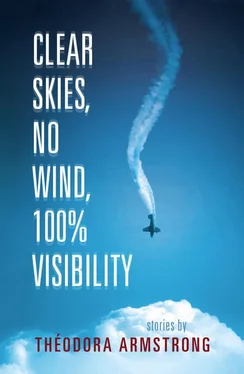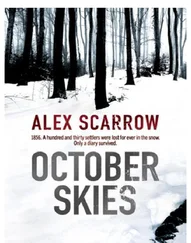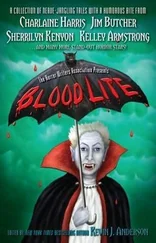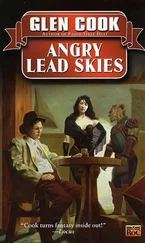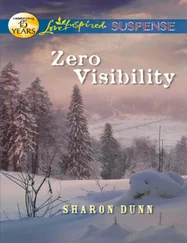I can hear papers being shuffled through the phone line.
“He was thirty.”
I thank them for their thoroughness and hang up the phone.
THERE’S ANOTHER CALL FROM the flight service station in the afternoon. Data that doesn’t correspond to the timeline and catapults me off the couch to scramble through drawers all over the house searching for some paper and a pen, the baby howling, startled by my abruptness, and Angie running her outside to walk the yard and calm her down. I watch them from the window, Angie pinching a yellow honeysuckle bloom free from the vine, holding it up to tickle Sophie’s nose. Everything right in the world. The supervisor must hear something in my voice, because he tells me — same as the TSB agent — this is standard protocol when a plane goes down. And why do they want my sleep account? He says the words again: standard protocol. He wants to know what kind of questions the TSB agent asked. I get him off the phone quickly without mentioning my worries, but there are things I’ve started thinking about ever since the call this morning. If I had exercised caution during that first communication with the pilot, advised him to land instead of wishing him safe travels like a fool, things could have turned out differently. There’s an empty aerodrome not too far from the crash site. There’s a field next to a high school nearby. I had to look closely at a map, but they’re there.
“Why do they keep calling?” The screen door slams as Angie comes back in with the baby, yellow pollen on her nose.
“I don’t know.” I rub my face in my hands. All day the extra sleep has hung over my head like the weight of a bottomless lake. “They’re going over the data. It’s standard protocol.”
“But what are they looking for?”
“How would I know that, Ange?”
“Shouldn’t you know?”
“I’m going for a walk.”
I intend to head for the forested paths behind the house, but as soon as my feet hit the front walk I lose steam and end up sitting on the edge of our curb, the sun barrelling down my back. The neighborhood is buzzing in the late-afternoon August heat, tinder-dry, vulnerable to any kind of spark. There’s been a water ban all summer and the lawns are brown and thirsty. There are thunderstorms in the forecast. From where I’m sitting I can hear the phone inside the house ringing.
IN THE MORNING WE prepare to leave for the cabin. On the radio they’re calling for a high of thirty-nine degrees Celsius. “Hotter here than Kuwait today,” I say, scanning the weather section of the newspaper.
“Maybe we should stay.” Angie’s leaning against the kitchen counter, arms crossed, holding her elbows the way she does when she’s willing to have a long talk. The baby’s in the playpen in the middle of the living room, ignoring us. She’s been fussy all morning from the heat. Angie says babies are sensitive to changes in a house. Somehow we’ve lost most of the day. At this rate we won’t reach Osoyoos until dinnertime.
“The car is packed.” I brush past her to fill my travel mug with the leftover dregs of morning coffee, but the pot’s empty. “Did you drink it all?”
“I’ll make more,” she says, without moving. “We can unpack the car.”
“I’ll make it.” I measure off spoonfuls. Pour the water. “Are you going to put on a shirt?”
Angie looks down at her sports bra. “It’s like a shirt.”
“No, it’s not.”
Early this morning I got another call, this time someone from the Critical Incident Stress Management team. It was a woman on the other end of the line, one of my peers, but the call was anonymous. The program is made up of a group of volunteer counsellors, people who have gone through similar incidents. I recognized the woman’s voice, but couldn’t place her. I asked her what she wanted to know, but she said she didn’t have any questions, just wanted to talk. I told her all I wanted to do was get a head start on my holiday.
“Why would we stay?” I ask Angie, folding the paper. The coffee machine starts spitting.
“Have you slept at all?”
“Yeah, I slept.”
In fact, I waited until Angie was asleep to pull out the maps again and spread them all over the kitchen table. I pored over the data, checking and double-checking, reviewing everything I knew to be true. There is an edge of doubt that seems to be wedging itself further into me. “Thom and Veronica are expecting us,” I say. “He barely leaves the house, you know.”
“Maybe we don’t need to be around that right now.”
“What difference does it make?” I throw some T-shirts into the last bag by the door. “We’re going to sit with our feet in the lake and drink beer.”
“Exactly.” She cracks a tray of ice and drops two cubes into her cup of coffee.
“Exactly?” I throw the duffel bag over my shoulder.
“I have a pretty clear idea of the way the entire weekend is going to go.” Angie sits down at the table and unfolds the newspaper.
“I’m taking this out to the car.”
THE HIGHWAY IS CONGESTED, cars packed to capacity, little faces pressed to back-seat windows, slack-faced boredom and wild eyes. In every car that passes I can see fights brewing like storm clouds sliding into a valley. When we got into the car the surfaces were so hot I could barely touch the steering wheel. Angie has been quiet since we left and just when I think she’s sleeping again she turns to me and asks, “Why do we always have to go somewhere on the long weekend?”
“Why would we stay home?”
“I don’t know.” She closes her eyes and rests her head against the window.
“You’re so tired all the time.”
“Too much sleep.” There’s a note of hopelessness in her voice, something I’ve heard before. Lately answers have been different between us, a slight shift, enough tilt to make a pencil roll off a table top.
“Maybe you should get that checked,” I say.
A few weeks ago Angie found a scrap of paper in my desk with the rough ideas for a poem sketched across it. It was something I’d done dead sober over a sleepless night, a few leftover thoughts from a poetry workshop I’d taken at university, scrawled so the words were barely legible. She was curious about it, excited by what she’d found, but for some reason seeing that paper in her hand made me feel shame. We had a huge fight. It was the white-paged honesty of it — the poem — that made me accuse her of being nosy, that made me say all sorts of insane things, that she was looking for girls’ numbers, that she thought I was heading to the bar after work to fuck waitresses. I told her that if I was going to get so much grief for doing nothing wrong, I might as well be fucking waitresses. We were standing in the kitchen and I stuffed the piece of paper into the garburator, barely getting my hand out of the hole before flipping the switch and setting the blades in motion.
“Look,” I say, checking Sophie in the rearview mirror. “She’s sleeping already.”
Angie’s taken off her shoes and placed a rolled-up hoodie behind her neck in preparation for the long drive.
“Close your eyes and sleep,” I say.
“I’m not going to sleep. I just don’t feel like looking at everything.”
After a while she asks me if I want to trade places.
“I’m fine.” I look over at Angie, but she stares straight ahead at an empty length of highway as though she hasn’t heard me. “I’m fine,” I say again.
“I know you are,” she says before closing her eyes.
THE LAST TIME WE saw Thom and Veronica was early spring. It was the first time they’d met Sophie — she was already nine months old — and Thom had looked stunned by her delicate hands and tiny teeth. He stuck a finger in her mouth and she bit him.
Читать дальше
